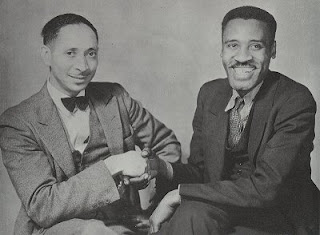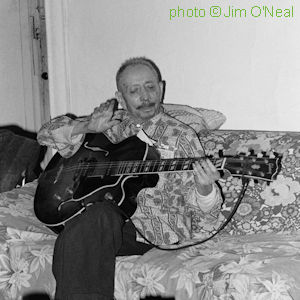Hudson Whittaker (January 8, 1903 – March 19, 1981), known as Tampa Red, was an American Chicago blues musician.
He is best remembered as a blues guitarist who had a distinctive single-string slide style. His songwriting and his bottleneck technique influenced other leading Chicago blues guitarists, such as Big Bill Broonzy, Robert Nighthawk and Muddy Waters, and many others, including Elmore James and Mose Allison. In a career spanning over 30 years, he also recorded pop, R&B and hokum songs. His best-known recordings include "Anna Lou Blues", "Black Angel Blues", "Crying Won't Help You", "It Hurts Me Too", and "Love Her with a Feeling".
Red was one of the most prolific blues recording artists of his era. It has been estimated that he recorded 335 songs on 78-rpm records, of which 251 were recorded between 1928 and 1942, making him the blues artist with the most recordings during that period. Most of his singles were released before Billboard magazine began tracking blues (and other "race music") in October 1942, and accurate sales records are not available. However, he had four singles that placed in the R&B top ten between 1942 and 1951.
Tampa Red was born Hudson Woodbridge in Smithville, Georgia. His parents died when he was a child, and he moved to Tampa, Florida, where he was raised by his aunt and grandmother and adopted their surname, Whittaker. He emulated his older brother, Eddie, who played the guitar, and he was especially inspired by an old street musician called Piccolo Pete, who first taught him to play blues licks on the guitar.
In the 1920s, having already perfected his slide technique, he moved to Chicago, Illinois, and began his career as a musician, adopting the name "Tampa Red", with reference to his childhood home and his light-coloured skin. His big break came when he was hired to accompany Ma Rainey. He began recording in 1928, with "It's Tight Like That", in a bawdy and humorous style that became known as hokum. His early recordings were mostly collaborations with Thomas A. Dorsey, known as Georgia Tom. The two recorded almost 90 sides, sometimes as the Hokum Boys or, with Frankie Jaxon, as Tampa Red's Hokum Jug Band.
In 1928, Red became the first black musician to play a National steel-bodied resonator guitar, the loudest and showiest guitar available before amplification, acquiring one in the first year in which they were available. This allowed him to develop his trademark bottleneck style, playing single-string runs, not block chords, which was a precursor of later blues and rock guitar soloing.
The National guitar he used was a gold-plated tricone,
which was found in Illinois in the 1990s by Randy Clemens, a music shop owner
and guitarist, and later sold to the Experience Music Project in Seattle. Red
was known as "The Man with the Gold Guitar", and into the 1930s he
was billed as "The Guitar Wizard". In 1931, Red recorded
"Depression Blues", including the topical lyrics, "If I could
tell my troubles, it would give my poor heart ease, but Depression has got me,
somebody help me please".
 |
| Tampa Red & Leroy Carr |
By the 1940s, Red was playing an electric guitar. In 1942, his "Let Me Play with Your Poodle", was a number 4 hit on Billboard's new "Harlem Hit Parade", a forerunner of the R&B chart. His 1949 recording "When Things Go Wrong with You (It Hurts Me Too)", another R&B hit, was covered by Elmore James. He was "rediscovered" in the blues revival of the late 1950s, like many other surviving early-recorded blues artists, such as Son House and Skip James. He made his last recordings in 1960.
His wife's death in 1953 was a blow from which Tampa Red never recovered. He had always been a heavy drinker, and his alcoholism became acute. Like many of his contemporaries, he was "rediscovered" by a new audience in the late 1950s. He went back into the studio in 1960, but his final recordings were undistinguished. He died destitute in a Chicago Nursing Home on March 19, 1981 from a heart attack, and was inducted into the Blues Foundation's Hall of Fame the same year. He is buried in Glenwood, Illinois.
(Edited mainly from Wikipedia)








For “Tampa Red – Dynamite! The Unsung King Of The Blues (Ace 2015)” go here;
ReplyDeletehttps://workupload.com/file/GPrdfYkX2HT
1-1 Evalena 2:59
1-2 Big Stars Falling Blues 3:12
1-3 Ramblers Blues 2:43
1-4 If I Don't Find Another True Love 3:05
1-5 So Crazy About You Baby 3:00
1-6 If She Don't Come Back 2:35
1-7 So Much Trouble 2:57
1-8 I'll Never Let You Go 2:20
1-9 Too Late Too Long 2:59
1-10 Got A Mind To Leave This Town 3:20
1-11 I'm Gonna Put You Down 2:48
1-12 But I Forgive You 2:51
1-13 Look A There Look A There 2:40
1-14 She's A Cool Operator 3:01
1-15 I Won't Let Her Do It 2:42
1-16 Green And Lucky Blues 2:47
1-17 Early In The Morning 3:13
1-18 She's Dynamite 2:18
1-19 Pretty Baby Blues 2:52
1-20 Sweet Little Angel 2:56
1-21 Midnight Boogie 2:46
1-22 I Miss My Lovin' Blues 2:55
1-23 1950 Blues 3:12
1-24 Love Her With A Feeling 3:17
1-25 It's Good Like That 2:35
2-1 New Deal Blues 3:12
2-2 That's Her Own Business 2:54
2-3 It's Too Late Now 2:57
2-4 It's A Brand New Boogey 2:55
2-5 When Things Go Wrong With You (It Hurts Me Too) 3:00
2-6 Please Try To See It My Way 3:04
2-7 Keep Jumping 2:38
2-8 I'll Dig You Sooner Or Later 2:53
2-9 Roaming And Rambling 2:58
2-10 I Know My Baby Loves Me 2:30
2-11 You Better Woo Your Baby 2:44
2-12 Let's Try It Again 2:54
2-13 Crying Won't Help You 3:13
2-14 Play Proof Woman 2:32
2-15 Corrine Blues 2:40
2-16 Detroit Blues 3:06
2-17 I Got My Habits On 3:11
2-18 Mary Lou Blues 2:49
2-19 Let Me Play With Your Poodle 2:36
2-20 My First Love Blues 2:56
2-21 She Want To Sell My Monkey 3:17
2-22 Mean And Evil Woman 2:51
2-23 Don't Deal With The Devil 2:48
2-24 You'd Better Be Ready To Go 3:01
2-25 Texas Stomp 2:52
Amazingly, many of the recordings guitarist Tampa Red made for RCA Victor and Bluebird in the '40s and early '50s never saw reissue until this 2015 double-disc by Ace. This set containing 50 tracks (five of which are previously unreleased), concentrates on his later career spanning the years 1941 to 1953, when he continually updated his style, blueprinted several future blues standards and worked with some of Chicago’s finest musicians.
One of the most successful, influential and prolific artists in his heyday, Hudson Whittaker’s (aka Tampa Red) importance in the development of post-war blues is somewhat forgotten. That he recorded hokum and pop alongside urban blues and favoured the kazoo on many recordings in preference to his slide guitar probably explains modern blues experts’ undervaluing of his catalogue, but this excellent compilation should hopefully lead to a positive reassessment. This is the perfect introduction to Tampa Red, a true legend of blues music.
A big thank you to the jazznblues club for the loan of above double CD.
Thanks for all the great shares!
ReplyDeleteMany thanks for this. Great set.
ReplyDeletefantastic
ReplyDeleteThanks
Who played lead guitar on Evalena and why is his name not taught in schools?
ReplyDeleteDear Chessman, The answer to your first question was found within a minute searching Discogs. It was William James Lacey, Blues guitarist, born Selma, Alabama, 25 February 1915, died Chicago, Illinois, 8 April 1977.
ReplyDeleteLacey recorded in the 1940s and 1950 as a sideman with a myriad of blues & Jazz singers such as Roosevelt Sykes, Sonny Boy Williamson, Doctor Clayton, Jazz Gillum, Eddie Boyd Trio, Washboard Sam, Arbee Stidham, Tampa Red and a whole lot more if you care to research.
The answer to your second question is the sad fact that he, like many other sidemen get very little acknowledgement for their contribution to the history of blues and jazz and unless someone can take the time to trawl through the archives and do the research then they will remain in the mists of time.. I only had a quick look but although he is mentioned sparingly in the Music Encyclopedia's it seems there is no full biography regarding William Lacey.
Regards, Bob
THANKS LOTS!
ReplyDelete